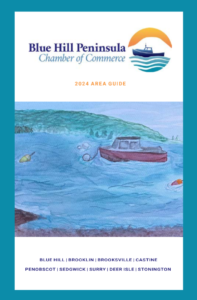Blue Hill Books to hold a book release and signing – Friday, June 1, 2018 – 7 PM – at the Bagaduce Music Library, in Blue Hill.
Blue Hill Books is hosting Hans M. Carlson, Executive Director of Blue Hill Heritage Trust, who will read from his newest book, Walking Toward Moosalamoo, and discuss land, cultures, and history in New England. There will be a reception and book signing following the talk.
A cultural and environmental historian, Carlson holds an MA from the University of Vermont, and a PhD from the University of Maine. He is an avid outdoors-man and has traveled extensively across northeastern Canada and the United States – by canoe, truck and on foot. These are the experiences at the heart of Walking Toward Moosalamoo. Prior to coming to Blue Hill, Carlson taught in the American Indian Studies Department at the University of Minnesota, and was Director of Great Mountain Forest, in northwest Connecticut. He is author of Home Is The Hunter: The James Bay Cree and Their Land, and was one of the principal authors of The Historical Atlas of Maine.
Walking Toward Moosalamoo is a story of humans and the earth. It is also a chronicle of backpacking on the section of the Appalachian Trail which runs from Mount Katahdin to a place called Mount Moosalamoo, in the Champlain Valley of Vermont. At bottom, it is an environmental inquiry into the dialog between humans and the land, one concerned with our current environmental crises, but also with the historical and cultural terrain of New England–its narrative geography. Along the way, Carlson muses on the ways we speak of the earth–how we often wound it with our words, but also how we limit our own freedom, and wound ourselves, by misrepresenting our storied relationship with the land that supports all our lives. This is an environmental and political argument for listening to the earth, but also one for listening to each other. In the telling of his trip, “Moosalamoo” is more metaphor than mountain – a destination in a new story, not simply a peak in the Green Mountains.
“This book started as an attempt to say something political about current environmental issues,” Carlson says, “but it isn’t the straightforward discussion I had once imagined. Over time, it became a meditation on the environmental context – the ecological parameters – of our history and culture, as well as current politics. It also became focused on the narrative context we share with all living things on the earth, and how political this is when you stop to think about it.”
Walking Toward Moosalamoo resembles those natural histories, popular in the eighteenth and early nineteenth century, written before the professionalization of the sciences and humanities into separate fields. This was a period when writers felt free to wander an open intellectual range not yet divided by disciplinary barbwire and academic no-trespassing signs. The book is interested in both the natural world and the cultural and historical meaning of nature, and so is infused and inscribed with the thoughts and actions of many hundreds of generations who are part of the land.
Native American history and culture are also at the center of this book. It is not just Euro-American cultural narrative that is important here, but the call and response of humans and the land going back many thousands of years. The weight of non-western intellectual traditions are a key part of its story, and the book is infused with Carlson’s personal relationship both the land and Native people of North America. “I would never presume to speak for Native peoples,” he says, “but this book would not be without their ideas. It was in their intellectual traditions that I encountered the possibility that it may not be just humans creating the narrative ecology in which we live – that we may not the only ones doing the talking. This simple notion reshaped a great deal of my thinking about environmental politics.”
Advanced praise for Walking Toward Moosalamoo
“Through the lens of a beguiling New England landscape Hans Carlson gives us a sensitively written and deeply personal reflection on the meaning of nature, history and culture in our current environmental predicament.”
Sir Peter Crane, Retired Dean of the Yale School of Forestry and Environmental Studies, and author of Ginkgo: The Tree that Time Forgot.
“This is a powerful account of the deep history of a remarkable corner of our remarkable planet. With its recognition that the stories we tell must reckon with the first people who inhabited our various places, it tends toward a real healing.”
Bill McKibben, author Eaarth
“Walking Toward Moosalamoo is an insightful and inspiring journey to explore how we’ve gotten to where we are and the work in front of all of us if we are to find a more equitable and ethical way forward. Building on Thoreau, Muir, and Leopold this inventive storytelling approach weaves the reader through the past, present and future.”
Buddy Huffaker, President & Executive Director of The Aldo Leopold Foundation



